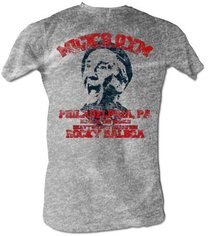Try as you might: it is difficult to ignore the magic of the Rocky movies. Whether you're a fan of the original 1976 Rocky movie, the subsequent sequels, the recent Rocky Balboa, or the even more recent, Creed franchise with Michael B. Jordan--the movies are magic.
In this article we're going to examine what makes the Rocky movies, and the Rocky Balboa character so important, so iconic, so inspirational by looking at how Sylvester Stallone created the character of the Rocky, what his inspiration was for the character, and how the filmmakers made the film so magical by infusing ancient Greek ideas in the film's music for special effect.
Perhaps, the short answer as to why the movie has such magic, is so inspirational is that Rocky represents the everyday man in the world, but also the underdog, and there's nothing more inspiring, more identifiable than the underdog; because we've all been there, at one point or another, sitting at the bottom with some kind of aspirations with regards to working our ways to the top -- we've all been an underdog.
But is it the character of Rocky that makes the movie so memorable and so inspiring to its legions of fans, or is it the situation that he finds himself in and how we overcome it?
Perhaps, it's both.

How did Sylvester Stallone create Rocky Balboa?
The story behind how Sylvester Stallone created Rocky Balboa is as inspirational as the character himself. Down on his luck in 1975, Stallone, then an out of work actor, took his inspiration for the story of Rocky from a boxing title bout match that he attended in Ohio between Muhammad Ali and Chuck Wepner.
At the time, Stallone only had a few acting credits to his name, having appeared in an adult film soft-core porn called The Party at Kitty and Studs in 1970, as well as two Roger Corman-produced films: Capone and Death Race 2000, shot in 1974. With almost no money to his name and on the verge of being evicted from his apartment in New York, Stallone wrote the screenplay for Rocky in three days. At the time, he was so destitute, that he had to sell off most of his personal effects for $25 dollars just so he could eat a few meals.
Stallone has discredited the idea that the character of Rocky is based Chuck Wepner, who, at the time he fought Ali, was a relative unknown boxer, a simple-minded athlete -- yet, it's difficult to ignore the obvious associations. With Wepner's status in the boxing world in 1975 be what it was, and his losing a title match against Ali -- he was such an up-and-comer that he was virtually unknown before he got his rare shot to go up against the greatest boxer of the twentieth century for the championship title.
Did making "Rocky" jumpstart Sylvester Stallone's career?
Rocky not only jumpstarted Stallone's career, but the film also earned him an Academy Award nomination for Best Actor at the 49th Academy Awards in 1977; the film also earned nominations for Best Supporting Actor for Burt Young and Best Movie, with it winning the latter for Stallone and producers Winkler-Chartoff. Stallone would go on to make several Rocky sequels as well as become one of the most well-known actors of all time in the wake of the box office success.
Why is Rocky Balboa depicted as dumb?
To say that the Rocky Balboa character is dumb is a bit of an over exaggeration. Perhaps, the better way of looking at the character, and this can be attributed to the magic that the movie has on audiences, is that he's not dumb, but instead, rather a simple-minded philosopher. Rocky isn't dumb, as much as he's a humble human being, that is just trying to make his way through life. He doesn't care about material possessions, only living a philosophical existence. He's a fine example of the Hollywood existential hero. How we identify with the character is in how most of us don't believe in ourselves enough when it comes to trying to achieve the impossible, but when we have people that believe in us, then everything in life becomes achievable and obtainable.
While the character of Rocky and his underdog story being the most inspirational for audiences, one tool that the filmmakers added that enhances the magical effect that the movie has on audiences, is its music and the use of the classical Greek fanfare.
In 2014, film composer Bill Conti, best known for his work composing the Rocky Theme "Gonna Fly Now" talked with us here at TVStoreOnline.com about the power, the magic of the movie and how the music serves it.
TV STORE ONLINE: Can we can talk about the fanfare in the Rocky "Gonna Fly Now" song? Those opening notes, the fanfare notes, are not only pivotal in Gonna Fly Now but throughout the rest of the music, you did for the Rocky movie score itself. Where do you think that your interest in fanfare comes from? Is it your background in opera or your love of brass...
CONTI: I think it was just a part of everything I'd ever listened to up to that point. When you sit down to write something, you say or think to yourself: “I want to do something that has never been done before.” What you really mean by that is that you're just going to go into your imagination and come back out with something that feels right to you. Music is like language. Shakespeare didn't invent the word “tomorrow.” But he figured out new ways to say it in a sentence. It's old material, but you figure out a new way to say it. It's really hard for a musician to be a blank slate. I don't know where it came from, only that, it was already just part of my vocabulary.
TV STORE ONLINE: The opening notes in Gonna Fly Now, the fanfare usage, does something psychological to audiences when they hear it...
CONTI: We know that The Greeks, Egyptians, and The Romans went into battle with a fanfare. They would go into battle with that in their minds. I know that doesn't mean that much to very many people today, and it may not have helped them in battle, but they certainly thought that it did.
TV STORE ONLINE: In thinking about what you said a moment ago regarding The Greeks and their use of the fanfare in battle... Didn't you take that as a kind of a “wheel” in a way and re-invent it, then? You took the fanfare, which is commonly used as an introduction or announcement as you mentioned, and turned it into a functional melody...
CONTI: Well, no, because you're not thinking of Water Music by Handel. Or Bach's Brandenburg Concerto No. 2... It's been around for quite a while. The Triumph March in Aida...
TV STORE ONLINE: But, melodically it's in the score in certain sad and quiet moments in the film... A scene that comes to mind is where Rocky is standing alone in the boxing arena with the ring and all the empty chairs...
CONTI: Right, it was very sad initially. In Reels #1-9 it's used very sadly, and then when we get to Reel #10--I decided it needed to be used in a very Wagnerian sense. I just turned it into something you could run and jump to.
TV STORE ONLINE: Those notes affect the human soul differently than others... There are certain chords or notes that seem, as a matter of opinion, to be more effective for stirring emotions than others. In particular, E minor 7 [Em7], seems to strike on an emotional level more than others...
CONTI: Okay, let's work from the back. There's the "pedal point" in Gonna Fly Now. When Rocky's running up the stairs...The pedal point is in G, and there is an F chord above it, and a C chord above it, and then a D minor chord above that. It's the G, which is under the last minute or so of the training montage that doesn't move. It just sits there. That's what makes it so tense because it's looking for resolution. It becomes exciting because of that. It's dramatic and that's what you want in music.
Shop Exclusive Rocky T-Shirts and Costumes

Rocky Logo Navy Blue T-shirt

Rocky Win Rocky Win T-shirt

Rocky You're a Bum T-shirt

Rocky Cut Me Mick T-shirt

Rocky Toy Rocky T-Shirt






































